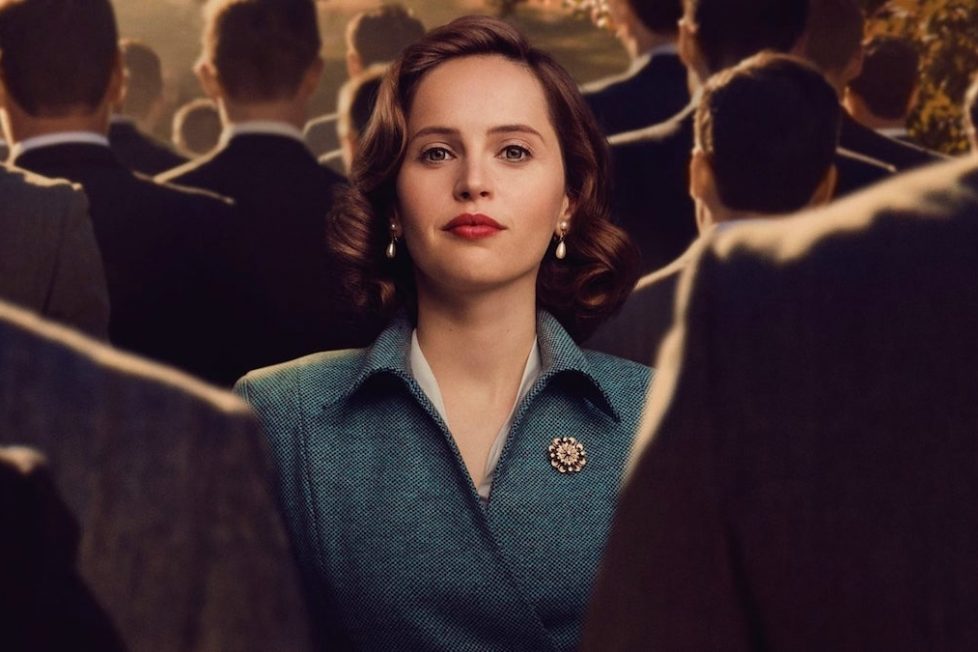ON THE BASIS OF SEX (2018)
The true story of Ruth Bader Ginsburg, her struggles for equal rights, and the early cases of a historic career that lead to her nomination and confirmation as US Supreme Court Associate Justice.

The true story of Ruth Bader Ginsburg, her struggles for equal rights, and the early cases of a historic career that lead to her nomination and confirmation as US Supreme Court Associate Justice.


Ruth Bader Ginsburg, “The Notorious R.B.G”, is an American institution, known around the world for her service on the United States Supreme Court. On the Basis of Sex focuses on a period of her life long before that stage of her career, beginning on Ruth’s first day at Harvard Law.
Her first experiences are suffering an introductory talk extolling the character of the “Havard Man”, a patronising soiree where the few female students are asked to justify the reasons they chose to study law, and classes where her hand in the air is always passed over for bigger, hairier hands. As Charlotte Whitton said, “Whatever women do they must do twice as well as men to be thought half as good. Luckily, this is not difficult.” And for Ruth this abides: she excels, graduating with exceptional credentials.
However, no New York law firm is willing to hire her, forcing her to become a professor, teaching the next generation about sex discrimination in the law. But one day, her supportive tax lawyer husband brings her a seemingly insignificant case with the potential to change the country: a man has been denied a tax allowance because the law states that only women can be carers. This is sex discrimination against a man, and if the patriarchal judiciary were to rule it unconstitutional, then that would set a precedent that could be used to chip away one-by-one at the hundreds of laws that discriminate against women.
As Ruth, Felicity Jones gives a sympathetic performance, but one that inevitably lacks Ginsburg’s Brooklyn Jewishness, feeling much closer to Jones’s prim Britishness. As her supportive husband, Martin, Armie Hammer gives a charismatic turn, but the screenplay (by Ruth’s nephew Daniel Stiepleman) has too much reverence for the couple to give them any nuance beyond saintliness. It’s the prickly supporting characters who are given the opportunity to display personality: Sam Waterston, Stephen Root, and Jack Reynor. They each get opportunities to play boo-worthy misogynists, whilst Justin Theroux and Kathy Bates play the purveyors of hard truths.
The script spends a lot of time focussing on Ruth and Martin’s relationship, and with their children, demonstrating how their home life embodied the values of gender equality that Ruth strove for in her professional life. However, beyond some early difficulties, their relationship was so devoid of conflict that it was also devoid of drama, making for unnecessary scenes. Far more vital and interesting is Ruth’s relationship with her daughter, Jane (Cailee Spaeny), who sees her mother’s teaching as pathetic and ineffectual compared to the radical action of those protesting in the streets.
For a writer with no other credits, what’s remarkable about Stiepleman’s script is how brilliantly it constructs scenes, setting up expectations that are being consistently wrong-footed, thus making for a compelling drama and giving the story real stakes. What’s also to be commended is how the film focuses on Ruth’s first great victory and ignores the temptation to dramatise, in any way, her ascension to the judiciary and ultimately the Supreme Court. The courtroom drama of the film is simply Ruth trying to convince three men that one man has been unfairly treated by the law. It’s compelling stuff.
Mimi Leder introduces us to the world of Harvard Law and it’s sexual politics with an elegant opening title sequence that may actually be the highlight of the film. Throughout, the direction is effective without ever being showy, which makes for an accurate representation of Ruth’s own personality. Michael Grady’s cinematography also captures the tone of the period without succumbing to pastiche, and Michelle Tesoro’s editing keeps the pace tight without feeling rushed. The film doesn’t outstay its welcome, even if it could do with trimming 20-minutes
For many, On the Basis of Sex was written off as an uninteresting and unremarkable story, but then RBG’s story is not one of towering oration and “YOU CAN’T HANDLE THE TRUTH!”-style declarations of guilt. After all, she can’t put the patriarchy on the stand. Everyone should be reminded that this is (relatively speaking) very recent history and Ruth’s part in the struggle for gender equality was simply to pick up the torch, run with it as far as she could, and then pass it to the next generation. And that is still, nonetheless, a very important story, which everyone involved has done an admirable job bringing to the screen.
This release comes with three making-of featurettes: “A Supreme Team: Making On The Basis of Sex”, “Martin & Ruth: A Loving Partnership”, and “Legacy of Justice”. All three are the usual mix of interviews and behind the scenes footage, with nothing particularly insightful to say.
director: Mimi Leder
writer: Daniel Stiepleman.
starring: Felicity Jones, Armie Hammer, Justin Theroux, Sam Waterston & Kathy Bates.
